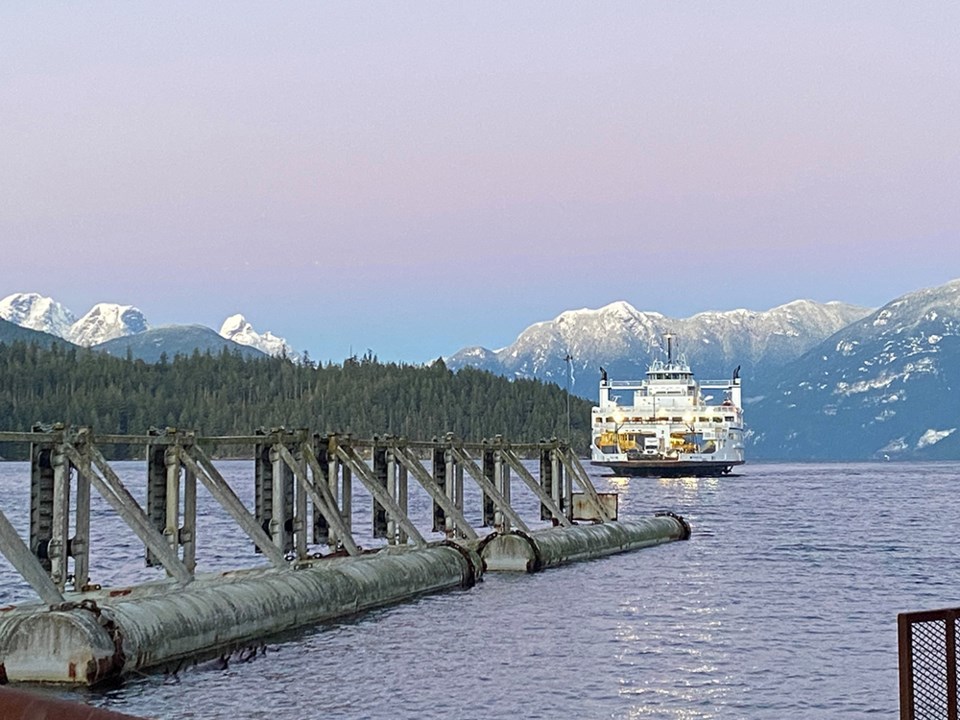qathet Regional District (qRD) directors were given an overview of an engagement project that BC Ferries is carrying out to gather information to develop plans for the future.
At the November 22 committee of the whole meeting, BC Ferries executive project director Jodi Dong said she was coordinating a long-term visioning project that BC Ferries is undertaking. She said the company had run a regional district workshop in late September and qRD manager of planning services Laura Roddan attended.
“She suggested that I come and speak to the board,” said Dong.
“What we are embarking on is a visioning process, which is a long-term plan for the coastal ferry system in BC. What we are doing here is a broader vision for the coastal ferry system and services out to 2050.
“The ministry of transportation did an engagement in 2020 and they came up with some themes that came out of that, but they were never translated into a tangible action plan because of the pandemic, and so many things that were happening then. We’re picking up that work.”
Dong said out of the process there may be new services or routes that may be identified, or other changes.
“We are asking for feedback,” said Dong. “We are doing a series of workshops and technical work that will frame that. That will help guide decisions. We start with a vision and out of that will come priorities for service levels and investment priorities.”
Dong said there is a survey and BC Ferries is encouraging everyone to take it. She said key goals have been identified. Reliable, safe and affordable transportation are all required in legislation but they have never been defined in terms of what they mean, to guide in decisions such as investment, according to Dong.
“Something that is really emerging now is better integration into the surrounding transportation systems,” said Dong. “How can we integrate planning with local plans? How can we integrate different modes to encourage people to take e-bikes or bikes, or transit where it is available, or other options?”
Dong said climate change, such as the impact on the ferry system, is a consideration, and what is the role of the ferry system in addressing emergency responses when they happen?
In terms of affordability, Dong said questions look at how that would be defined and are there different ways to price at different times?
There are also open questions on the survey for respondents to provide feedback.
Dong said if people go to bcferries.com, there is a link to the survey. She said there is a frequently asked questions button that people can access. The survey is open until November 28 and BC Ferries will be conducting further engagement in the new year, said Dong. BC Ferries will be putting out a report in January, and then will put out a draft vision in the spring of 2024, and will conduct another round of engagement. The vision is scheduled to be published in June 2024.
Late with loading
qRD Electoral Area D director and committee chair Sandy McCormick said she was glad BC Ferries is carrying out the engagement.
She brought up scheduling, as it relates to on-time performance. She said the scheduling of ferries often does not allow enough time for a boatload of vehicles to unload and another full load to reload. She said she receives service notices almost every day indicating ferries are delayed because of heavy loads.
“Will BC Ferries adopt schedules that allow the time it takes to fully load and unload full loads of vehicles?” asked McCormick.
Dong said she would have to get an answer for that.
McCormick then brought up employee retention and crew shortages, which have affected so many routes, particularly in the qathet region. She asked if BC Ferries would follow a similar model to the RCMP in addressing problem areas for recruitment.
Dong said work is being done to identify how to get more skilled workers, and looking at immigration requirements.
“I know it’s a big priority to be looking at this,” said Dong.
City of Powell River director Cindy Elliott said this region is small and perhaps the voice from the community is drowned out by larger centres with different needs. She said future trends should include employee recruitment that supports smaller communities. She added that affordability should encompass more than ferry fares and should stretch to costs people incur when they are delayed in getting home, or from medical appointments.
“There are cases where people have been discharged from hospital in Vancouver and were not able to plan ahead, and in a vulnerable state, can’t get home,” said Elliott. “For people who live here, it’s not a cruise ship.”
Join the Peak's email list for the top headlines right in your inbox Monday to Friday.




